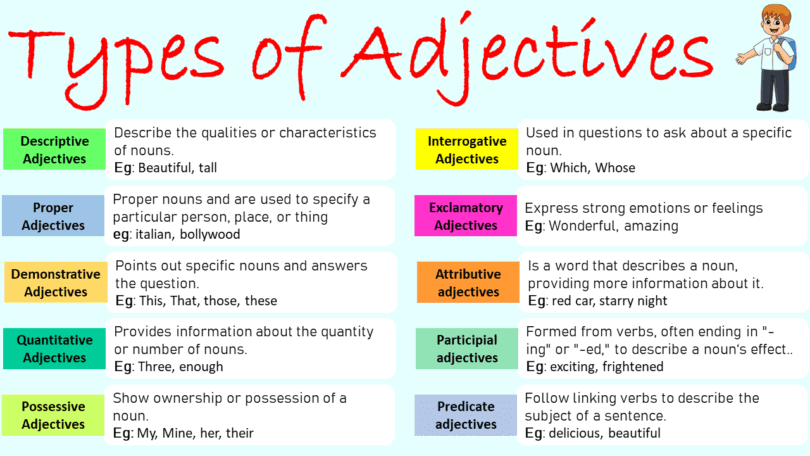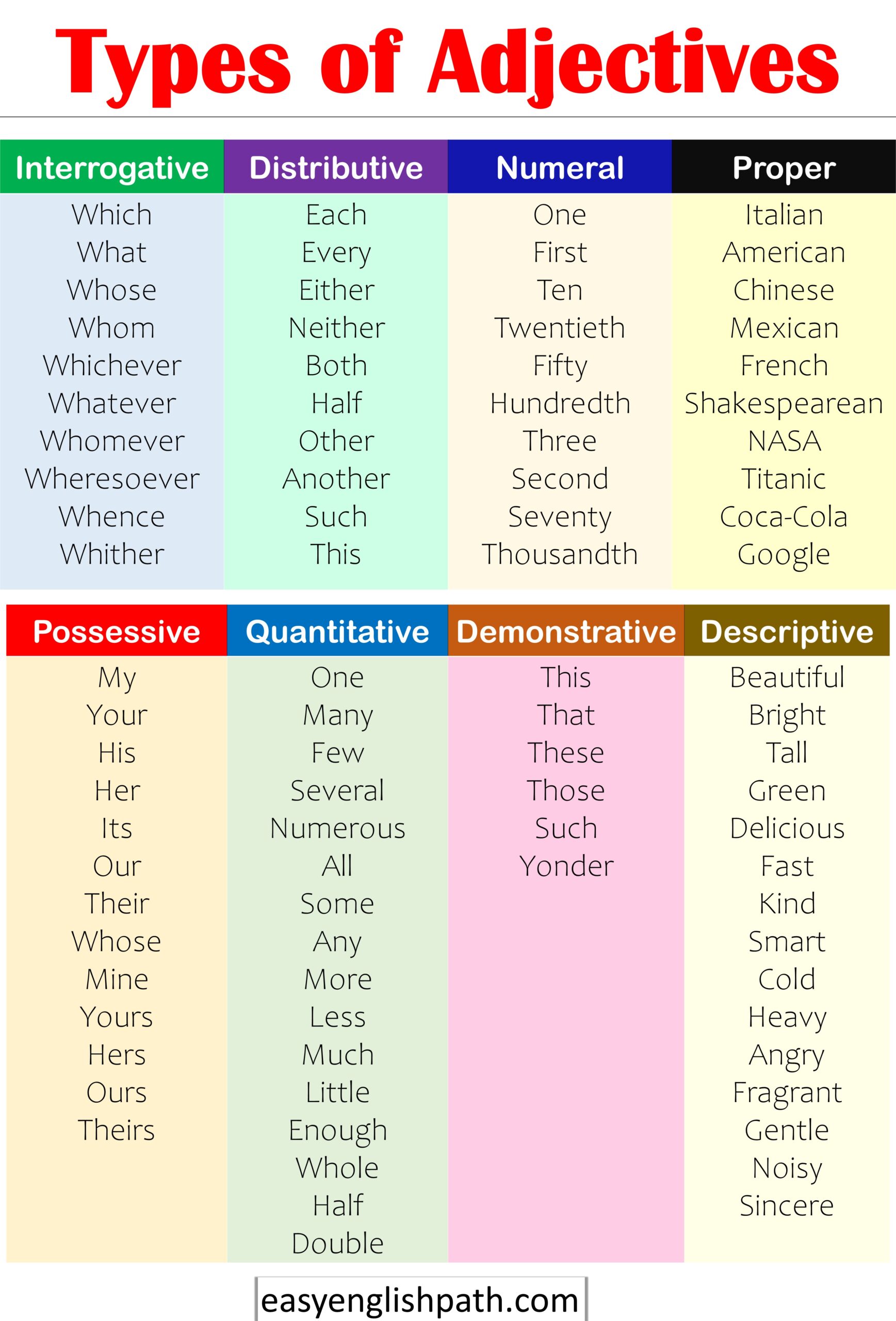Adjectives have great importance in the English Language. They are used to describe and modify nouns to convey a more detailed picture. In this blog post, we will discuss what adjectives are, their significance, and the various types of adjectives. Whether you’re a student looking to improve your grammar or just curious about language, this article will help you grasp the concept of adjectives very clearly.
What is an Adjective?
An adjective is a word that is used to describe or modify a noun (a person, place, thing, or idea). It provides additional information about the noun, making the sentences more understandable and interesting. Adjectives allow us to answer questions like What kind? Or which one? and help us create a clearer image of the noun.
For Example:
- The bright sun warmed the beach.
- She wore a blue dress to the party.
Comparative and Superlative form of Adjectives:
1. Comparative Form:
This form is used to compare two things or to show a higher degree of a quality in one thing compared to another.
♦ For most one-syllable adjectives, we need to add ‘ER’ to the adjective.
Examples:
Fast (adjective) → Faster (comparative)
Tall (adjective) → Taller (comparative)
♦ For one-syllable adjectives that end in ‘E’ we just need to add ‘R’
Examples:
Large (adjective) → Larger (comparative)
Brave (adjective) → Braver (comparative)
♦ For one-syllable adjectives with a single vowel and a single consonant at the end, it will double the final consonant before adding ‘ER’
Examples:
Big (adjective) → Bigger (comparative)
Hot (adjective) → Hotter (comparative)
♦ For two-syllable adjectives that end in ‘Y’ will change the ‘Y’ to ‘I ‘and add ‘ER’
Examples:
Happy (adjective) → Happier (comparative)
Busy (adjective) → Busier (comparative)
♦ For most two-syllable adjectives and all adjectives with three or more syllables, we will use ‘MORE’ before the adjective.
Examples:
Beautiful (adjective) → More beautiful (comparative)
Interesting (adjective) → More interesting (comparative)
2. Superlative Form:
This form is used to show the highest degree of a quality among three or more things.
♦ For most one-syllable adjectives, you need to add ‘ST’ to the adjective.
Examples:
Fast (adjective) → Fastest (superlative)
Tall (adjective) → Tallest (superlative)
♦ For one-syllable adjectives that end in ‘E’ just you need to add ‘ST’
Examples:
Large (adjective) → Largest (superlative)
Brave (adjective) → Bravest (superlative)
♦ For one-syllable adjectives with a single vowel and a single consonant at the end, double the final consonant before adding ‘ EST’
Examples:
Big (adjective) → Biggest (superlative)
Hot (adjective) → Hottest (superlative)
♦ For two-syllable adjectives that end in ‘Y’ change the ‘Y’ to ‘I ‘ and add ‘EST’
Examples:
Happy (adjective) → Happiest (superlative)
Busy (adjective) → Busiest (superlative)
♦ For most two-syllable adjectives and all adjectives with three or more syllables, use ‘MOST’ before the adjective.
Examples:
Beautiful (adjective) → Most beautiful (superlative)
Interesting (adjective) → Most interesting (superlative)
How Adjectives are Used in Sentences?
Adjectives are used in sentences to modify and describe nouns (people, places, things, or ideas). They perform the following purposes:
♦ Descriptive Function:
Adjectives are used to provide more information about a noun, such as its qualities, characteristics, or attributes.
For example, in the sentence ‘The beautiful flowers bloomed,’ the word –>beautiful describes the flowers, It makes the sentence more detailed and colorful.
♦ Determinative Function:
Adjectives can also be used to help specify which noun you’re talking about or how many there are.
For instance, in the sentence ‘I want three apples,’ the word –>three specifies the quantity of apples, and in I like that book,’ the word
–>that indicates a particular book.
♦ Possessive Function:
These adjectives are used to indicate ownership or possession. Example words- My, Your, His, Her, Its, Our, and Their.”
For instance, “This is my car” shows that the car belongs to the speaker.
♦ Interrogative Function:
These adjectives are used to ask questions about nouns. interrogative adjectives Words: Which, What, and Whose.
For example, ‘Which book do you want to read? Here ‘Which’ is being used to ask about a specific book.
♦ Exclamatory Function:
These adjectives are used to express strong emotions or feelings in exclamatory sentences. They help convey excitement, surprise, or emphasis.
For example, ‘What an amazing view! ‘here -Amazing is used to express admiration.
Types of Adjectives
Adjectives can be categorized into several types based on the kind of information they provide. Below are some common types of adjectives:
- Descriptive Adjectives
- Proper Adjectives
- Demonstrative Adjectives
- Quantitative Adjectives
- Possessive Adjectives
- Interrogative Adjectives
- Exclamatory Adjectives
- Comparative Adjectives
- Superlative Adjectives
- Distributive Adjectives
- Numeral Adjectives
- Predicative Adjectives
- Compound Adjectives
- Participial Adjectives
1. Descriptive Adjectives:
These adjectives describe the characteristics or qualities of a noun. They answer questions like ‘What’s it like?’ or ‘What’s its nature?’
Examples
The beautiful flowers bloomed in the garden.
The tall skyscraper stood out in the city.
2. Proper Adjectives:
These adjectives are derived from proper nouns and are used to specify a particular person, place, or thing. They are always capitalized.
Examples
She served Italian pasta for dinner.
The concert featured Bollywood music.
3. Demonstrative Adjectives:
These adjectives are used to point out specific nouns. The most common demonstrative adjectives are This, That, These, and Those. They answer the question ‘Which one? or Which ones?’
Examples
I would like to buy this book.
Are those your shoes?
4. Quantitative Adjectives:
These adjectives provide information about the quantity or number of nouns. They answer questions like ‘How many?’ or How much?’
Examples
She bought three apples.
He has enough money to go on a vacation.
5. Possessive Adjectives:
These Adjectives are used to show ownership or possession of the noun. Common possessive adjectives Words My, Your, His, Her, Its, Our, and Their.
Examples
This is my car.
Their dog is very friendly.
6. Interrogative Adjectives:
These adjectives are used in questions to ask about a specific noun. Common interrogative adjectives Words ‘Which, What, and Whose.’
Examples
Which book do you want to read?
Whose phone is this?
7. Exclamatory Adjectives:
These adjectives are used to express strong emotions or feelings. They are often followed by an exclamation mark and help convey excitement or surprise.
Examples
What a wonderful surprise!
That’s an amazing performance!
Adjective Words with Sentences
| Adjective | Sample Sentence |
|---|---|
| Fast | He is a fast runner. |
| Tall | She is the tallest person in the room. |
| Large | We need a large table for the party. |
| Brave | The firefighter showed brave courage. |
| Happy | Her smile always makes me feel happy. |
| Busy | He’s too busy to take a vacation right now. |
| Beautiful | The sunset over the ocean is beautiful. |
| Interesting | The book she recommended was quite interesting. |
| Good | This is a good book to read. |
| Old | The old castle is a historic landmark. |
| Clever | She came up with a clever solution to the problem. |
| Cold | It’s so cold outside in the winter. |
| Small | This is a small gift for you. |
| Green | The grass is always so green in the spring. |
| Strong | He is known for his strong leadership. |
| Kind | She is a very kind and caring person. |
| Curious | The curious child asked many questions. |
| Delicious | This pizza is absolutely delicious. |
| Shiny | The jewelry in the store looks shiny. |
| Fragile | Handle the glassware carefully; it’s fragile. |
| Silly | The children’s silly antics made everyone laugh. |
| Smart | He’s a smart student who excels in math. |
| Loud | The party was so loud that it woke the neighbors. |
| Elegant | She looked elegant in her evening gown. |
| Modern | This apartment has a modern design. |
| Noisy | The construction site was extremely noisy. |
| Tasty | The homemade cookies are incredibly tasty. |
| Huge | The new shopping mall is huge. |
| Patient | You need to be patient when teaching beginners. |
| Friendly | She is always friendly to her coworkers. |
| Colorful | The garden is filled with colorful flowers. |
| Famous | The actor is famous for his roles in action films. |
| Sleepy | After a long day, I feel sleepy and exhausted. |
| Funny | His jokes are always so funny. |
| Honest | An honest person always tells the truth. |
| Proud | She is proud of her accomplishments. |
| Quiet | The library is a quiet place to study. |
| Gentle | The cat has a gentle and friendly nature. |
| New | They bought a new car last week. |
| Warm | The blanket is so warm and cozy. |
| Clean | The house is spotlessly clean. |
| Creative | The artist has a creative mind. |
| Young | The young puppy is full of energy. |
| Helpful | He’s always helpful and willing to assist. |
| Safe | The neighborhood is safe to walk at night. |
| Spacious | The living room is spacious and airy. |
You May Also Like






